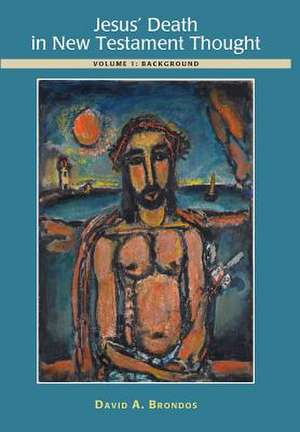Jesus' Death in New Testament Thought
Autor David A Brondosen Limba Engleză Hardback – 25 apr 2018
Preț: 314.29 lei
Nou
Puncte Express: 471
Preț estimativ în valută:
60.15€ • 62.14$ • 50.06£
60.15€ • 62.14$ • 50.06£
Carte disponibilă
Livrare economică 04-18 martie
Preluare comenzi: 021 569.72.76
Specificații
ISBN-13: 9786079803421
ISBN-10: 6079803429
Pagini: 722
Dimensiuni: 161 x 240 x 43 mm
Greutate: 1.16 kg
Editura: Comunidad Teológica de México
ISBN-10: 6079803429
Pagini: 722
Dimensiuni: 161 x 240 x 43 mm
Greutate: 1.16 kg
Editura: Comunidad Teológica de México
Notă biografică
David A. Brondos is an ordained minister of the Evangelical Lutheran Church in America who has served as Professor of Theology and Biblical Studies at the Theological Community of Mexico since 1996, the same year in which he received his PhD degree from King's College London. From 2000-2004 he served as Dean of the Theological Community, a consortium of seminaries in Mexico City that includes Augsburg Lutheran Seminary, where he also teaches Lutheran studies. In 2011, David was named Coordinator of the Seminary's online course program, which over the past seven years has enrolled hundreds of students from over 25 countries, including all of the Spanish-speaking countries of Latin America, Spain, and the United States. A member of the Society of Biblical Literature since 2002, David has published articles and books in both English and Spanish in the areas of New Testament studies, Pauline theology, the history of Christian thought, and Lutheran doctrine. From 2011-2014 he served as Chair of the Steering Committee of the ELCA Association of Teaching Theologians, and since 2011 he has been a member of the Editorial Council of Dialog: A Journal of Theology¿ in which a number of his articles have appeared. His biblical and theological writings include four books published by Fortress Press (Minneapolis): The Letter and the Spirit: Discerning God's Will in a Complex World (2005), Paul on the Cross: Reconstructing the Apostle's Story of Redemption (2006), Fortress Introduction to Salvation and the Cross (2007), and Redeeming the Gospel: The Christian Faith Reconsidered (2011). To commemorate the 500th anniversary of the posting of Martin Luther's 95 Theses, on Oct. 31, 2017 David posted 94 theses of his own on his website http://94t.mx, where other of his writings, both published and unpublished, can be found. The present work, Jesus' Death in New Testament Thought, is the result of over 40 years of research on the subject of the salvific significance ascribed to Jesus' death in the New Testament and in Christian theology from patristic times to the present.
